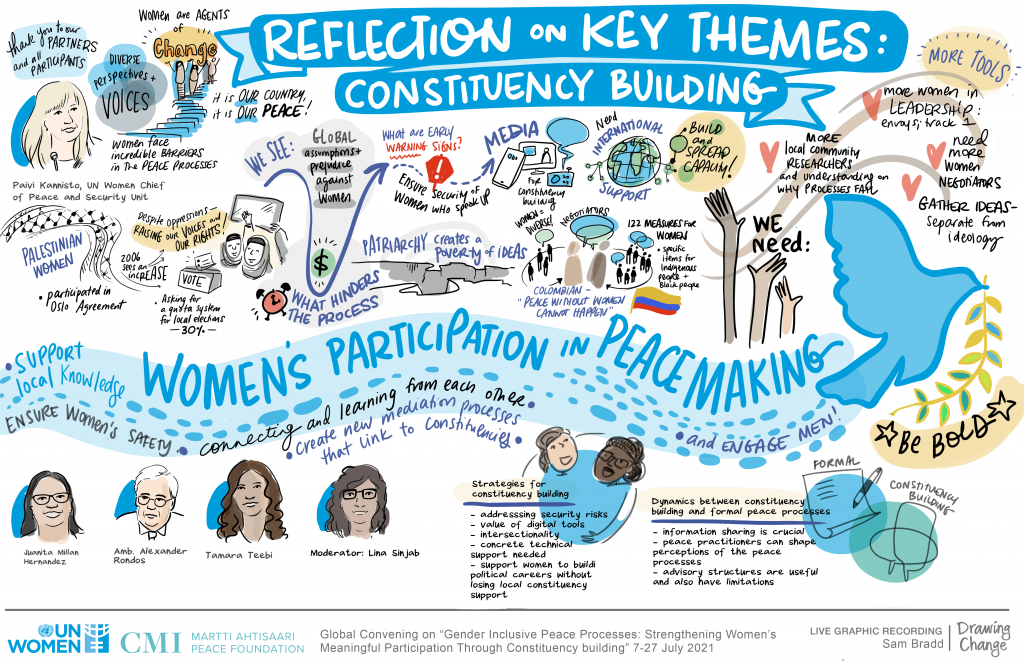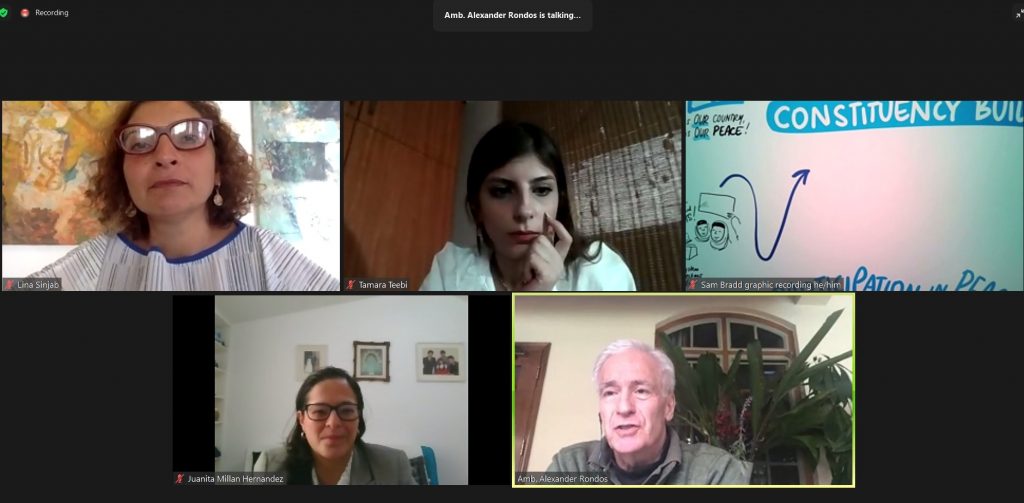“Step by step, the change will happen” – reflections on constituency building
The month-long global conference on gender-inclusive peace processes co-hosted by UN Women and CMI ended 27 July. It concluded with a virtual closing event that examined the key themes and trends of constituency building and inclusive peacemaking.

Graphic Recorder Sam Bradd’s sketch on the closing session.
The conference, titled Gender-Inclusive Peace Processes: Strengthening Women’s Meaningful Participation through Constituency Building, was run in the virtual sessions, working groups and using the SparkBlue conference platform, and examined the challenges and good practices of constituency building and gender-inclusive peace processes.
Two working group sessions discussed strategies for building and nurturing constituencies, and the dynamics between constituency building and formal peace processes. CMI and UN Women will publish a post-conference report detailing the content and conclusions of these discussions.
UN Women’s Chief of Peace and Security, Päivi Kannisto, kicked off the conference’s closing session by thanking all the participants for engaging in such in-depth and important discussions on the topic. She said that due to the slow progress with implementing the Women, Peace, and Security agenda, such platforms and gatherings are vital in bringing forward the lessons learned.
“You are the ones shaping global thinking and policies. Step by step, the change will happen.”

Moderator Lina Sinjab with the panelists.
Women’s exclusion unjust and counterproductive
Journalist Lina Sinjab from BBC Middle East moderated a panel debate featuring Palestinian human rights activist Tamara Teebi, former EUSR for the Horn of Africa and mediation expert Ambassador Alexander Rondos, and Senior Mediation Advisor on Security Arrangements at UN Mediation Standby Team Juanita Millan Hernandez. They examined emerging trends and developments of gender-inclusive peace processes.
Ambassador Alexander Rondos reflected on the role of women in conflict prevention and early warning mechanisms. Early warning often starts within families and spreads into the communities. This is where women can play central roles in identifying and communicating the warning signs before tensions flare up into violence. “At the same time, it is important that we ensure the security of women who speak up,” he stressed.
The key factors hindering participants’ liaison with their constituencies during peace processes are lack of financial support, and insufficient time and quick pace of the process. Women need to be given the independence and tools to build and nurture their own constituencies. Tamara Teebi spoke of the importance of women’s networks and support of the international community in this regard.
“We need to build alliances – regional, national and global. To this end, the international community should provide women representatives financial and technical support.”
Juanita Millan Hernandez told of her experiences of the peace process in Columbia and how different women’s groups managed to set aside their differences and find a common purpose for peace. “People tend to think women are one single group. But women are not homogenous; they are very diverse.”
UN Women’s Assistant Secretary-General & Deputy Executive Director Åsa Regnér and CMI’s Programme Director Dr. Ville Brummer gave closing remarks of the session.
“Now that we are assessing the outcomes of the conference, we have to look at the future. What are the most crucial points for the next five years?”, asked Ville Brummer.
“Women’s exclusion is not only unjust, it’s also counterproductive. Women’s participation makes peace processes more sustainable”, explained Åsa Regnér.
This conference was made possible through a long-term collaboration with and financial support from the German Federal Ministry for Economic Cooperation and Development (BMZ) in cooperation with Deutsche Gesellschaft für Internationale Zusammenarbeit (GIZ) GmbH and the Finnish Ministry for Foreign Affairs.